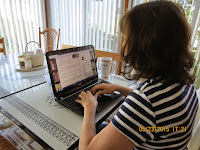 |
| This is the 2014 edition. I haven't started the 2015 edition. |
Words, a writer’s
paintbrush. Storytelling, essay writing,
and poetry carry music and rhythm in the words.
Writers paint images and whole worlds with words. Writers fill the senses with vivid smells,
sharp textures. Writers create life
through characterization. The characters are real, feel emotion, endure drama,
and some may even survive the story. A
writer is an artist.
Embodying that artistry can be
stressful, especially during the holiday season. With all the concerts and cookie bakes, the
parties and gift-buying, sometimes writers need to place their creative talent
with words on hold until after the rush.
Or do they?
Holiday cards. I don’t know about you, but I still send them
out. Not everyone I know is online. At least some of my relatives aren’t. Yet they all know I’m writing. Because of this self-inflicted artistry I
placed upon myself, I feel obligated to produce an entertaining Lees Through
the Year 2015 letter to accompany an original photo card with pithy or poetic
wishes on it. Relatives and friends I
haven’t seen in a while look forward to these letters and cards each year. They tell me so. They thank me profusely when I send them.
Yet I fret over the letter, what
to say, which events, which memories to include. As a writer, I feel my talents judged by the
receivers of these cards and letters, be they friends or relatives. I don’t wish to sound boastful in the letters,
simply entertaining. I don’t want to
bore; I want to infuse my words with laughter, with story. The letter isn’t memoir it’s conversational, I
remind myself. No themes or pithy
insight. Yet I imagine the need to
appear witty, to create memorable lines.
I consider myself a writer even
though I’ve sold only a handful of stories and essays. The key word in that statement is sold.
I’ve written plenty for local free markets. *Sigh*
The holidays are a time to catch
up with family and friends, tell stories, enjoy delicious homemade baked goods
with tea, and linger over wine and cheese platters. It’s a time to enjoy one another’s company.
With all the list-making and
gift-buying; the home decorating and meal planning; baking cookies and breads,
pies and cakes, do you ever feel the added pressure of creativity with words at
Christmastime? Please let me know how
you fit creativity into the holiday rush or if you worry about words because of
your craft.
Have a wonderful Christmas and
holiday season!







.JPG)


